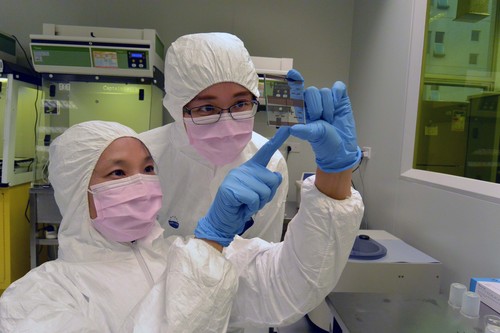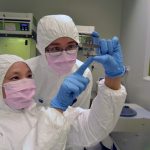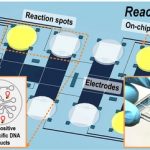 UM has developed a new type of fast and accurate parasite detection method
UM has developed a new type of fast and accurate parasite detection method
A research team from the University of Macau (UM) has achieved a new breakthrough. The team has developed a fast, accurate, and convenient point-of-care pathogen detection method with the help of the digital microfluidic system. This method uses isothermal DNA amplification together with specific DNA Molecular Beacon probe on a digital microfluidic chip to detect life-threatening parasite infection. In addition to obtaining fast results in 40 minutes, this method can also lower the reaction volume to one-tenth (1-μL) of the volume required with conventional methods. Discrimination of non-specific amplification and lower risks of aerosol contamination also mean that this system has the potential for clinical applications. The study has been published in Scientific Reports, a journal under the Nature Publishing Group.
The research paper is titled ‘A Digital Microfluidic System for Loop-Mediated Isothermal Amplification and Sequence Specific Pathogen Detection’. The study was conducted by a multidisciplinary microfluidics research team from UM’s State-Key Laboratory of Analog and Mixed-Signal VLSI (AMSV), whose members include Wan Liang, Chen Tianlan, Gao Jie, Dong Cheng, Jia Yanwei (corresponding author), Mak Pui In, and Rui Martins, in collaboration with Ada Wong Hang Heng and Chuxia Deng from the Faculty of Health Sciences. This research study is supported by the Science and Technology Development Fund of Macao. The study is based on the core technology of digital microfluidics developed by the microfluidics team. Their research fields include microfluidic technologies, portable automatic medical devices for disease diagnostics, and microfluidic devices for cell culture and drug screening. The team established a class-1000 cleanroom in 2015, which covers an area of roughly 60square metres and is equipped with sophisticated instruments that can accomplish various technical tasks, including soft lithography and nanodeposition, which are essential steps for digital microfluidic chip fabrication.
Digital microfluidics (DMF) is an emerging technology that manipulates individual microliter- to nanoliter-sized droplets on an array of electrodes by electro-wetting force. Its electric driving and miniature footprint features make it a promising technology for point-of-care testing. In molecular diagnostics, loop-mediated isothermal amplification (LAMP) can synthesise mass of DNA at a constant temperature, and significantly simplifies the requirement on reaction equipment. However, clinical molecular diagnostics often produces false-positive results because of non-specific amplification or aerosol contamination, which can cause adverse consequences on clinical decision. In this study, the team designed a low melting temperature Molecular Beacon DNA probe as a specific indicator for true-positive results. The probe only emits fluorescence signals when detecting specific DNA products. Moreover, the use of DMF chip helps to avoid aerosol contamination. Thus, false-positive results were not produced in this system.
View gallery


